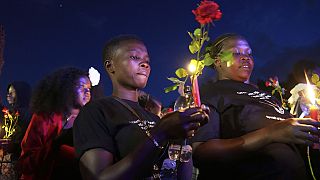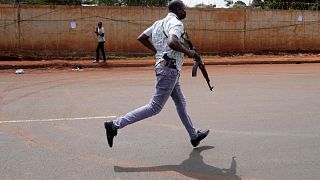Kenya
Kenyan Njeri Migwi stands out as a voice for justice amid the rising violent fatal attacks on women in her country
She is the co-founder of Usikimye, a movement working towards ending the prevalence of sexual and gender-based violence (SGBV), offering a voice and refuge for victims and survivors.
Standing on the balcony of the Usikimye office, Migwi recounts how she found conviction to do the work she does.
"I found my voice in helping others, because I am a survivor of gender-based violence myself. And in helping others, I healed myself and found my voice," she said.
According to the Kenya government’s reports, almost 60 women have been killed since the start of 2024.
In protest, Migwi, alongside other feminist and non-governmental groups, organised anti-femicide demonstrations around Kenya’s major cities and towns in January against the killings.
Thousands took part in the mass action, which was the largest event ever held in the country against sexual and gender-based violence.
But Migwi is dissatisfied as femicide rates have continued to rise, and everyday she sees or deals with a new case of violence.
In March, a 19-year-old girl was allegedly pushed to her death from the 20th floor of an apartment building in Nairobi.
Another woman was allegedly hacked to death by her husband soon after their wedding in Nakuru.
Then, even closer home, Migwi's employee, Sarah, survived an attempt on her life for allegedly ‘dressing like a man’.
"Sarah was dressed in jeans and a hoodie. How is that dressing like a man? And anyway, what is dressing like a man? Why are we gendering clothes? It's clothes," Migwi said.
Legal counsel and assistance
She lays the blame squarely on social conventions for normalizing acts of violence, mostly towards women, as well as the country's law structure which se perceives as being complacent in handing out justice to victims, and the government for inaction.
Migwi is however spurred by the various ‘wins’ and success stories as a result of the work she and other like-minded organizations and individuals do.
Migwi and other organisations have put together safe-houses that ensure that SGBV victims have a haven against the violations directed at them.
She recalls a recent encounter with a woman she once helped escape from Female Genital Mutilation (FGM), now a supermarket attendant, who hugged her tightly in gratitude in the aisles as Migwi was shopping.
Sheila, from rural central Kenya, now lives and works in Nairobi.
She expressed her gratitude for Migwi's work.
"I met Njeri when I was staying in Thika through a friend (who) rescued me from female circumcision. My husband and his parents wanted to circumcise me, but through a friend, (he) rescued me from those hands to Njeri's," Shiyonga said.
Usikimye, which is Swahili for ‘Don't Keep Quiet’, undertakes other activities in the communities like feeding programs for children three days a week.
Migwi says "predators lure children" with food, so she feeds them to "make sure that I eliminate where predators can get these kids."
Usikimye also helps to source legal counsel and medical assistance for victims of SGBV.












01:01
Kenya: Visa-free travel now available for many African and Caribbean countries
00:22
Boniface Kariuki, a Kenyan mask vendor shot at close range laid to rest
11:17
Bridging the legal gap in Africa’s digital boom {Business Africa}
Go to video
First Malaria treatment for babies approved
02:16
Kenya's William Ruto faces growing discontent over economy and police brutality
00:52
UN warns global progress on gender equality is at risk